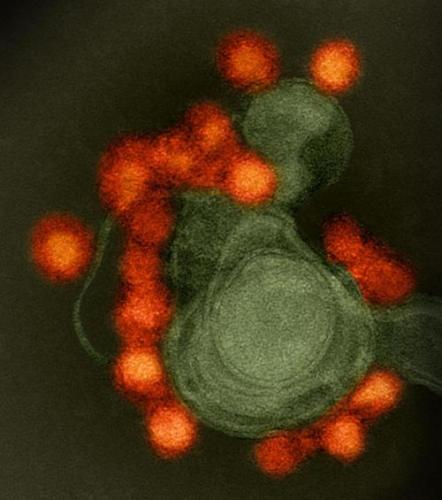Zika virus persists in the central nervous system and lymph nodes of Rhesus monkeys
Virus found in tissues weeks after clearance from blood.
Zika virus can persist in cerebrospinal fluid (CSF), lymph nodes and colorectal tissue of infected rhesus monkeys for weeks after the virus has been cleared from blood, urine and mucosal secretions, according to a study. The research was led by Dan H. Barouch, M.D., Ph.D., and colleagues at Beth Israel Deaconess Medical Center and Harvard Medical School and was funded in part by the National Institute of Allergy and Infectious Diseases (NIAID), part of the National Institutes of Health.

Transmission electron microscope image of negative-stained, Fortaleza-strain Zika virus (red), isolated from a microcephaly case in Brazil.
Investigators infected 20 rhesus monkeys with Zika virus and noted that although virus was cleared from peripheral blood within 7-10 days, they detected Zika virus in CSF for up to 42 days and in lymph nodes and colorectal biopsies for up to 72 days. Immunologic data showed that the emergence of Zika virus-specific neutralizing antibodies correlated with the rapid control of the virus in plasma. However, Zika-specific antibodies were not detected in CSF, which could be why the virus remained in CSF longer. The authors also found that viral persistence in CSF correlated with the activation of the mechanistic target of rapamycin (mTOR) pathway, which has been shown to be related to the development of brain tissue and brain malformations.
The findings suggest that persistent virus in the central nervous system may contribute to the neurological issues associated with Zika virus infection in people, the authors note. Although Zika virus usually causes mild or no symptoms in people, it has been associated with neurological disorders in children and adults and can cause severe fetal defects, such as microcephaly, if an infected pregnant woman passes the virus to her fetus. The authors note it is possible that if the virus can persist in the central nervous system and other tissues in humans with Zika infection, more extensive neurologic and lymphoid disease than currently appreciated may be occurring.
Source: U.S. National Institutes of Health
- 288 reads
Human Rights
Ringing FOWPAL’s Peace Bell for the World:Nobel Peace Prize Laureates’ Visions and Actions

Protecting the World’s Cultural Diversity for a Sustainable Future

The Peace Bell Resonates at the 27th Eurasian Economic Summit

Declaration of World Day of the Power of Hope Endorsed by People in 158 Nations

Puppet Show I International Friendship Day 2020

